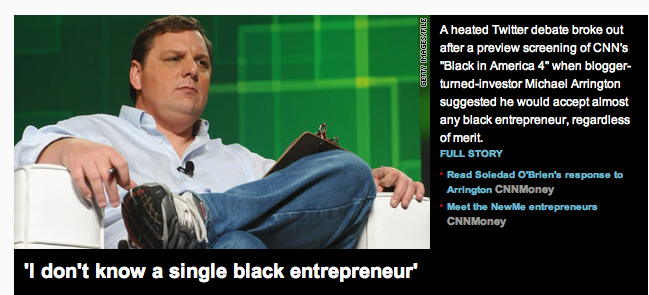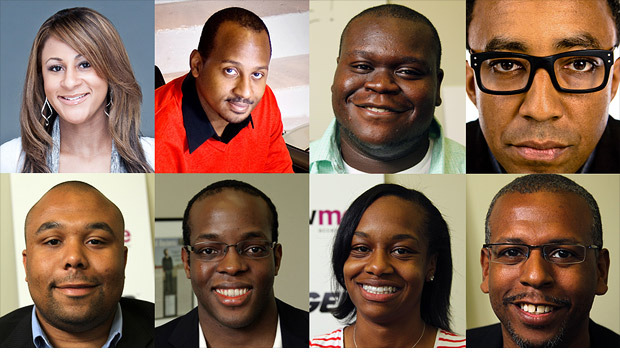 Almost no one has seen episode 4 of CNN’s documentary series “Black in America,” about race in the technology world, but a lot of folks are already jumping in on the race controversy the show’s promo has kickstarted.
Almost no one has seen episode 4 of CNN’s documentary series “Black in America,” about race in the technology world, but a lot of folks are already jumping in on the race controversy the show’s promo has kickstarted.
A lot of folks need to shut up and wait till it airs.
Black in America: The New Promised Land – Silicon Valley, is about the journey of eight participants in the NewMe Accelerator program for black tech founders, who bring their startup concepts to Silicon Valley in an attempt to make it big. The founders get access to mentorship from industry veterans and proximity to the hottest technology companies in the world. This classic bildungsroman tale is spiced up when the founders have to live together in a small Mountain View, Calif. house, which injects a little Real World-style drama into an already meaty storyline.
This past Thursday I was invited by the Black Founders of Silicon Valley to a screening of the documentary, and, to put it bluntly, I have to say that CNN missed the mark. While the documentary shines a bright light on a very taboo subject — race and merit in technology, never does it ask if people are actually going to use the products the founders so passionately believe in. How much traction do these companies have? How many customers? How big is the market? These are the nuts and bolts of business and the types of questions that guide investment decisions. Investors ask these questions to see if products are fulfilling a need or solving a problem. Some of the NewMe startups are solving problems, while others just aren’t.
Silicon Valley thrives on ideas, but there is bias in all of us. The extent to which we project race bias onto ourselves and the world is a subject of endless debate. Black in America does an admirable job of showing how racial prejudice is still alive and well. Two poignant scenes from the documentary really drive this point home. After a late night of hacking on his startup, NewMe co-founder Wayne Sutton is racially profiled by Mountain View police, who detain him and run his record to see if he has a criminal history. The cops couldn’t understand why a black man was walking through a residential neighborhood after dark, Sutton tells the camera crew, in a moment of raw emotion. Maybe it does happen, but it’s really hard to imagine Indian or Southeast Asian engineers being stopped on their way home because it’s late and the police don’t recognize them. Blacks and Latinos in this country know the routine.
In another gripping scene, Vivek Wadhwa, a NewMe mentor, advocates for the NewMe founders to get a white guy to front their companies, and they are gobsmacked. The notion that their ideas will play better if articulated from white mouths, cuts to the quick.
But here’s where the plot line gets a little thin. While the characters themselves were very compelling, their startups concepts were not. Few of the NewMe companies were tackling large problems or seemed to have a truly innovative idea that was going to disrupt existing markets.  BeCouply wants to help couples have an epic social life, as co-founder Pius Uzamere says, and while I’ve been single for a while now, I was unaware that couples have a problem socializing. Uzamare’s laptop sports a huge MIT Alumni bumper sticker, and he was student body president, so there’s probably a pony in there somewhere. Could there be more than meets the eye with his mobile app? As with all consumer-facing startups, we’ll just have to wait and see.
BeCouply wants to help couples have an epic social life, as co-founder Pius Uzamere says, and while I’ve been single for a while now, I was unaware that couples have a problem socializing. Uzamare’s laptop sports a huge MIT Alumni bumper sticker, and he was student body president, so there’s probably a pony in there somewhere. Could there be more than meets the eye with his mobile app? As with all consumer-facing startups, we’ll just have to wait and see.
Kloud.co was the most technical company of the eight featured in Black in America, and by far had the most defensible product. Kloud.co is a service that will allow its users to search for media of various types across services such as Twitter, Dropbox and Google Docs. Founder Hank Williams is a seasoned entrepreneur who started ClickRadio, a music streaming service, in 2000. Kloud definitely had the most tech behind it, and if Dropbox is $4 billion company, so too could it be. In his website bio, Williams says Kloud will change humanity.
To be fair, all startups stay in a half-baked state until they’ve got lots of users/customers, and have significant funding or both. (Color, for example, one of the most noted failed startups of the year, has $41 million in investment, and still lacks users.) While the “pivot” may be the most overused term in the Valley, most startups change their focus many times before they come up with something that sticks. Only after people have come to rely on the core product does it becomes much harder to change direction. I don’t think that the NewMe startups featured in Black in America are any more or less half-baked than the hundreds of startups I’ve seen. But CNN lays bare the added challenges the founders face because they don’t fit the pattern of previous successful tech CEOs.
In a deft maneuver sure to boost ratings, CNN ensnared TechCrunch founder Michael Arrington in a controversy when they posted a clip of him saying he didn’t know any black entrepreneurs in Silicon Valley. Needless to say, the video caused quite a stir, and Arrington dutifully played along, howling that he’s not a racist and that he was duped by Soledad O’Brien. In making the conversation about one man, CNN ensured that the journalist with the most visible personal platform in tech told everyone that there’s a documentary coming out. Well played.
But one man cannot change the racial makeup of Silicon Valley, even if he helped bring much-needed attention to the subject.  Ultimately what is going to change the perception of blacks in Silicon Valley is when a black founder creates a multibillion dollar startup that does what Twitter, Apple or Facebook have done to transform our lives. For potential investors the point is not only to create a company for its own sake, but to create extraordinary returns on investment. Greed is colorblind.
Ultimately what is going to change the perception of blacks in Silicon Valley is when a black founder creates a multibillion dollar startup that does what Twitter, Apple or Facebook have done to transform our lives. For potential investors the point is not only to create a company for its own sake, but to create extraordinary returns on investment. Greed is colorblind.
The tenacity it takes to make it as an entrepreneur, and to do so with so many obstacles, is a quality any investor should seek out in founders. At the end of the day, the ideas still have to stand on their own, and if they don’t, it’s not because of race. Customers too don’t care, as long as the product works. CNN does not answer the question of whether NewMe founders are creating something that people are going to use, and this is why it missed the mark.
VentureBeat's mission is to be a digital town square for technical decision-makers to gain knowledge about transformative enterprise technology and transact. Learn More

